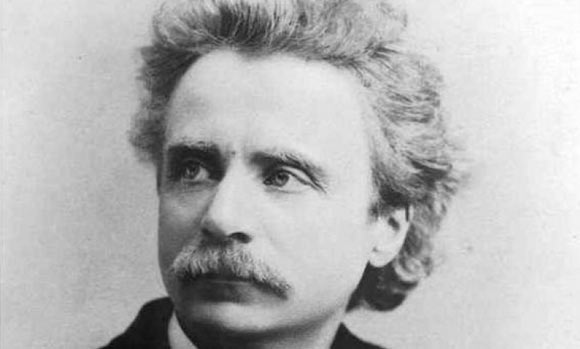
Edvard Grieg was a Norwegian Composer and Pianist who was known for his works during the Romantic Era. He was also known for his role in the formation of the Norwegian Identity through his music.
Edvard Hagerup Grieg was born on June 15, 1843 in Bergen, Norway. Grieg drew much of his early music influence from his mother, Gesine Judithe Hagerup, who was a music teacher at the time of his birth. Grieg’s mother was a daughter to an established politician in Norway, and hence she was very well trained in music. Grieg’s mother taught him how to play the piano at the young age of six. His musical ability grew with age and when Grieg was fifteen years old, he met Norwegian Violinist Ole Bull at a family gathering. Bull immediately noticed Grieg’s gift at the piano and she urged Grieg’s parents to send him to the Leipzig Conservatory. Grieg’s parents ultimately heeded Bull’s advice and the young Grieg finished his piano education at the Leipzig Conservatory. There, Grieg was nearly killed by lung disease, and he spent the remainder of his life in great difficulty due to the damage caused to his left lung.
Grieg’s first performance after his graduation in 1862 was at his hometown in Bergen. There, he played the Beethoven’s Sonata “Pathetique”. Grieg went on to make his way into prominent music circles. He was a close friend of Rikard Nordraak, who was the composer of the Norwegian National Anthem. At Nordraak’s death, Grieg wrote his funeral march. Grieg was also on good terms with Niels Gade and Johann Peter Hartmann. Grieg wrote many piano concertos during this time. In 1868, he received a testimonial from virtuoso pianist and legendary composer Franz Liszt. Grieg then obtained a travel grant from the Norwegian Government, which enabled him to refer many of his works to Liszt. Liszt was so impressed with Grieg’s works that he even played one of Grieg’s piano concertos in Rome, where the two composers had first met. Liszt was also highly appreciative of Grieg’s Violin Sonata No.1.
Grieg composed a variety of piano, choral, vocal, and chamber works. Some of his most famous pieces included the music for Henrik Ibsen’s play, “Peer Gynt”. It included the famous excerpt titled “The Hall of the Mountain King” which was greatly revered by musicians then. He also composed “Holberg Suite” for the piano which was also very well received by his peers. Another one of his famous works was his “Sixty Six Lyric Pieces for Piano in Ten Books”. He also wrote a Lyric Piece for an Orchestra. Many of his pieces contained lyrics from famous artists such as Heinrich Heine, Rudyard Kipling, Johann Wolfgang von Goethe and Hans Christian Andersen. Much of Grieg’s music would also be used in Norwegian Popular Culture, including the highly famous operetta of 1944 titled “The Song of Norway”. The far reaching influence of his music can even be seen in video games such as “Mountain King”, “Hunt the Wumpus”, and many others, all of which include many of Grieg’s exciting music.
Edvard Grieg died on September 4, 1904 in his hometown, Bergen, Norway. He died from complications that had arisen due to tuberculosis and pleurisy. His funeral was attended by tens of thousands of people. Such was the respect given to this great Norwegian Composer.